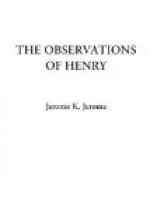“Later on the Society sent him still further inland, to open up a fresh station; and there it was that, according to the newspapers, the cannibals got hold of him and ate him. As I said, personally I don’t believe it. One of these days he’ll turn up, sound and whole; he is that sort.”
THE SURPRISE OF MR. MILBERRY.
“It’s not the sort of thing to tell ’em,” remarked Henry, as, with his napkin over his arm, he leant against one of the pillars of the verandah, and sipped the glass of Burgundy I had poured out for him; “and they wouldn’t believe it if you did tell ’em, not one of ’em. But it’s the truth, for all that. Without the clothes they couldn’t do it.”
“Who wouldn’t believe what?” I asked. He had a curious habit, had Henry, of commenting aloud upon his own unspoken thoughts, thereby bestowing upon his conversation much of the quality of the double acrostic. We had been discussing the question whether sardines served their purpose better as a hors d’oeuvre or as a savoury; and I found myself wondering for the moment why sardines, above all other fish, should be of an unbelieving nature; while endeavouring to picture to myself the costume best adapted to display the somewhat difficult figure of a sardine. Henry put down his glass, and came to my rescue with the necessary explanation.
“Why, women—that they can tell one baby from another, without its clothes. I’ve got a sister, a monthly nurse, and she will tell you for a fact, if you care to ask her, that up to three months of age there isn’t really any difference between ’em. You can tell a girl from a boy and a Christian child from a black heathen, perhaps; but to fancy you can put your finger on an unclothed infant and say: ’That’s a Smith, or that’s a Jones,’ as the case may be—why, it’s sheer nonsense. Take the things off ’em, and shake them up in a blanket, and I’ll bet you what you like that which is which you’d never be able to tell again so long as you lived.”
I agreed with Henry, so far as my own personal powers of discrimination might be concerned, but I suggested that to Mrs. Jones or Mrs. Smith there would surely occur some means of identification.
“So they’d tell you themselves, no doubt,” replied Henry; “and of course, I am not thinking of cases where the child might have a mole or a squint, as might come in useful. But take ’em in general, kids are as much alike as sardines of the same age would be. Anyhow, I knew a case where a fool of a young nurse mixed up two children at an hotel, and to this day neither of those women is sure that she’s got her own.”




